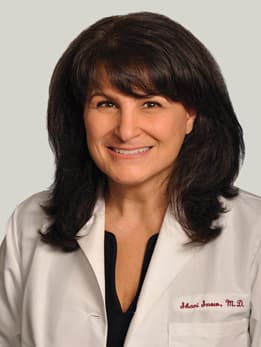Don’t suffer in silence: Get answers about uterine fibroid symptoms and treatment

Uterine fibroids affect everyone differently. As minimally invasive gynecologic surgeons at the Center for the Advanced Treatment and Research (CATeR) of Uterine Fibroids, we see patients with symptoms that range from mild and manageable to unbearable and emergent.
While we can offer some helpful information to address common questions about fibroids, the best way to get the specific answers you need is to talk with your doctor — in-person or virtually — about your personal symptoms and concerns, including:-
Signs and Symptoms
Does heavy bleeding mean I have a fibroid?
Fibroids can cause abnormal bleeding from the uterus, including heavy menstrual periods. Some patients may even have bleeding between periods. In some cases, the bleeding can be so significant that they develop anemia (not having enough red blood cells) or require blood transfusions.
Heavy or abnormal vaginal bleeding can also be a symptom of other conditions, such as adenomyosis and some gynecologic cancers. If you are experiencing heavy bleeding, don’t hesitate to discuss it with your doctor.Are fibroids painful?
Fibroids can cause painful periods, often with cramping. Menstrual cramping can sometimes be alleviated by medication such as ibuprofen, birth control pills or IUDs. Painful and heavy periods can often be improved with fibroid therapies.
Can fibroids make your stomach bulge?
If you have fibroids, you may have bloating or bulging in your lower abdomen that doesn’t go away. You might feel like there is pressure in your pelvis or have cramps when you don’t have your period. You may experience bladder pressure or find that you go to the bathroom to urinate frequently. You may also notice a change in your bowel habits.
Can fibroids cause vaginal discharge?
Fibroids don’t usually cause vaginal discharge like the kind associated with a yeast infection. Instead, fibroids typically cause heavier-than-normal periods.
Although, fibroids don’t cause vaginal infections, the risk for bacterial vaginosis and yeast infections may be higher in those who wear sanitary pads daily or use feminine hygiene products (douches or vaginal sprays, powders or washes). If you are experiencing a vaginal odor or persistent vaginal discharge, please see your provider for evaluation.Can stress make fibroids worse?
If you have fibroids, you may notice that your symptoms get worse when you’re under stress. One theory is that stress causes your muscles to tense up, which can contribute to fibroid pain. Changing hormone levels also may play a role.
A few studies have also suggested that stress might cause fibroids, but more research is needed.Can you have fibroids with no symptoms?
Even though fibroids often cause frustrating symptoms like heavy bleeding and bloating, they don’t always offer these warning signs. For some patients, fibroids can be “silent” and cause no symptoms at all. That is why early detection is important.
A gynecologist can detect fibroids during a regular pelvic exam. Imaging tests like ultrasounds and magnetic resonance imaging (MRI) can confirm if you have fibroids and tell specialists more about the size, location and number of fibroids in your uterus.Risk Factors
Can birth control cause fibroids?
Elevated levels of estrogen and progesterone play a role in the development of fibroids, but hormone-containing oral contraceptives do not seem to cause fibroids. In fact, some research suggests birth control pills may help reduce the risk for fibroids in some patients.
Why are fibroids more common in Black patients?
Researchers are unsure why people of African ancestry are more likely to have fibroids, but they have some theories. Genes may be a factor, since the prevalence of fibroids is similar in Black women in the United States and in Africa. Another theory is that the sun forms vitamin D in the skin, skin pigment blocks this process, and vitamin D insufficiency is linked to fibroids. Lifestyle, socioeconomic factors and environmental pollution also may play a role.
Understanding the reasons for this disparity is a primary focus of uterine fibroid research at the University of Chicago Medicine.Does the COVID-19 vaccine cause fibroids?
There is no evidence that the COVID-19 vaccine causes fibroids. Being vaccinated also does not appear to make fibroids worse.
Can chemicals in cosmetics and food products raise my risk for fibroids?
Some studies have found a connection between hair relaxers and a higher risk for fibroids in patients of African ancestry. One theory is that chemicals like bisphenol A (BPA) and parabens found in relaxers could interfere with hormones and raise the risk for fibroids. These chemicals are widely used in other cosmetics and food products. However, more research is needed to understand if these chemicals are a direct cause of fibroids.
Do sexually transmitted infections (STIs) cause fibroids?
No, STIs do not cause fibroids.
Can diet or herbal supplements shrink existing fibroids?
No, dietary changes and herbal supplements cannot shrink existing fibroids. Herbal supplements may contain plant-based hormones that could lead to increased fibroid growth.
Fibroids and Sex
Can fibroids cause pain during sex?
Even though fibroids grow in the uterus and not the vagina, painful intercourse is a common symptom of fibroids and one of the main reasons people seek treatment. Whether the pain is mild or more severe, it can have an impact on the quality of your sex life.
Can fibroids affect my sex drive?
Yes, besides causing pain during sex, fibroids can affect your libido in several ways. Heavy bleeding can put a damper on intimacy. Bloating also can have a negative impact on body image. However, treatments are available to ease these symptoms and potentially restore your sex drive.
Fibroids and Menopause
Will fibroids go away with menopause?
Fibroids do not go away after menopause. However, fibroid symptoms like heavy bleeding usually stop in menopause because periods have stopped. Symptoms like bulging, bloating and pressure may still be bothersome. Fortunately, these can be treated.
Do fibroids get bigger with menopause?
Typically, fibroids stop growing in menopause. That’s because they need the hormones progesterone and estrogen to grow. When levels of these hormones fall in menopause, fibroids tend to stay as they are.
Can fibroids turn cancerous after menopause?
Fibroids are benign (noncancerous) growths. Based on the current evidence, fibroids do not appear to become cancerous over time, including after menopause.
However, there are some types of uterine cancer that can look like fibroids. That is why it’s best to have access to a team of specialists with extensive experience diagnosing and treating both conditions.Treatment for Uterine Fibroids
Can fibroids go away without surgery?
In patients of all ages, only about 10 percent of fibroids will shrink on their own. The rest will grow larger or stay the same size.
Is hysterectomy the only option for fibroids?
A hysterectomy is a surgery to remove the uterus and cervix. Not all fibroids require a hysterectomy to relieve symptoms.
Q&A: What you need to know about hysterectomy
One surgical alternative — called myomectomy — is to remove the fibroids while leaving the uterus in place. Another option is uterine fibroid embolization (UFE). For fibroids that do not cause significant symptoms, another option is to simply monitor them over time.
At the CATeR Fibroid Center, our experts can help you understand the pros and cons based on your specific health concerns and goals.How will I know which fibroid treatment is right for me?
When considering fibroid treatments, be sure that you understand all of the options available to you. When you meet with a specialist, consider asking these questions before making your decision:
- What fibroid treatment do you recommend for me?
- Why do you think it is the best one for me?
- How will this treatment affect my fertility?
- What other fibroid treatments are available?
- Why don’t you think they are the best options for me?
When discussing fibroid treatment options with a specialist, you should also feel confident that your provider understands your goals and concerns.
Explore treatment options at the CATeR Fibroid Center
Can medication help fibroids?
Oriahnn and Myfembree are two pills studied and approved at the University of Chicago Medicine to manage heavy bleeding in premenopausal patients with fibroids. These drugs, called gonadotropin-release hormone (GnRH) agonists, block hormone production to help shrink fibroids. They should not be used in patients trying to become pregnant.
Learn more about uterine fibroids research at UChicago Medicine
Birth control pills and other forms of hormonal treatments (including injectables, implants and IUDs) can help manage heavy bleeding, although they are not options for patients planning to become pregnant.
Other drugs that can manage heavy bleeding like Lysteda and Cyklokapron are only taken during your period. They contain a medicine called tranexamic acid that helps reduce heavy bleeding.
To ease pain symptoms, nonsteroidal anti-inflammatory drugs, such as ibuprofen or naproxen, may offer some relief.Can fibroids come back after removal?
After having fibroid treatments that preserve your uterus like myomectomy or UFE, you may develop new fibroids.
A hysterectomy, the surgical removal of the uterus, is the only option in which there is no risk for recurrence of fibroids.How can I stop fibroids from recurring?
Having a healthy lifestyle can help reduce your risk for developing new fibroids. Research has shown that you may be able to prevent future fibroids if you:
- Maintain a healthy weight.
- Limit your alcohol intake.
- Reduce the amount of red meat you eat.
- Eat a diet rich with fruits and vegetables.
- Take a vitamin D supplement if you are vitamin D- deficient.
Can diet, supplements or lifestyle changes reduce symptoms of fibroids?
Some patients find that making dietary changes like eating more fruits and vegetables and reducing red meat, caffeine and alcohol consumption can improve their symptoms. Lifestyle changes like reducing stress and stopping smoking may also be of benefit.
At UChicago Medicine, research is underway to determine if green tea extract and vitamin D supplements could treat fibroids without surgery. Before taking any supplements, be sure to speak with your doctor.
About the Authors
Sandra Laveaux, MD, MPH, Monica Christmas, MD, and Shari Snow, MD, are minimally invasive gynecologic surgeons at the Center for the Advanced Treatment and Research (CATeR) of Uterine Fibroids.



